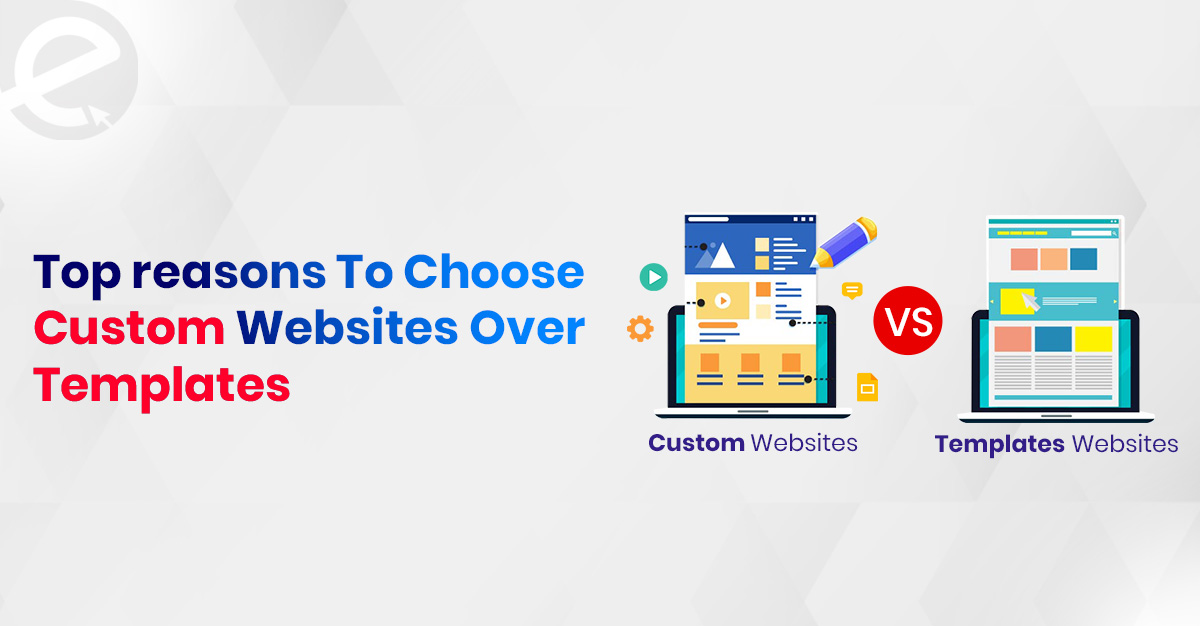
We Develop Websites Keeping Marketing in Mind
Why does your business require custom websites over templates?
 Jul. 30, 2025, 12:00 AM
Jul. 30, 2025, 12:00 AM- By Eclick Softwares and Solutions

A custom website allows you to build a unique digital presence that aligns precisely with your brand’s value and business objectives. Templates, on the other hand, with all their “customisation” options often result websites that looks similar to many others in the market. According to GoodFirms, 73% of the businesses believe having a unique website design improves their credibility. Another study by Blue Corona indicated that 48% of consumers judge the credibility of a company solely based on its website design. Considering the same, it is safe to say that a custom designed business website helps you build your unique brand identity, perform better compared to templates and offers website visitors improved user experience.
When to consider custom website development?
Website is the primary source of leads and sales:For companies that depend on online engagement such as service providers, consultants, or eCommerce brands, the website often serves as the first impression and the main source of leads and revenue. In this context, investing in a custom designed website is a strategic move that can generate measurable returns.
Business competing in a saturated market: Standing out in a highly-competitive industry is difficult. When many businesses offer similar products or services, it becomes increasingly difficult to capture attention of the target audiences. A custom-developed, user-focused website can be beneficial for businesses, especially when competitors are using the same generic templates.
Business has unique branding requirements: For businesses like premium hotels, boutiques, creative website design & development company, official website works as the testament of credibility. When aesthetics, brand perception or credibility are critical to your business model, a custom designed website gives you full control over how your brand is presented.
When to consider template-based websites?
• Quick setup required: When you are at the early stage of your business, a template-based website might be suitable for you. It can help you establish a digital presence and share essential information with potential customers.
• Minimal budget: If your budget is extremely limited and you are looking for a low-cost or free platform to build and maintain a website, you can go for template-based options. It will help you take your business online without ongoing expenses.
• Basic content-focused site: When your business requires a basic brochure-style site to share details like services, and business hours, with minimal content updates, you will be benefited from template-based websites.
A comparison of the key features of custom-designed and template-based website
• Dynamic content filtering
Websites with huge content benefit greatly from dynamic filtering options. This feature allows users to sort and narrow down results. Whether the user is browsing products, reading articles, or searching for something specific, this feature of custom designed website makes it easier to find what they need quickly and efficiently.
Template-based websites sometimes offer basic filtering options, but they are often limited to simple categories or tags. Customising filters for large amounts of content or advanced sorting is not easy on template-based websites. It often requires extra plug-ins or custom coding. For businesses managing wide product ranges or diverse content libraries, these limitations can slow down user experience and affect engagement.
• Customer behavior-driven personalization
Custom websites use complex data from CRM inputs like purchase history, location, and real-time behavior to deliver highly personalized experiences. Returning users may see tailored recommendations, previously viewed items, or exclusive offers, all based on their browsing behavior and preferences.
Template-based websites usually offer generic user experiences. While some plug-ins or third-party integrations are available, these are often one-size-fits-all solutions. Businesses that need more control over how user experience is tailored to individuals might find that template-based sites lack the flexibility.
• Custom content management systems (CMS)
Instead of forcing teams to adapt to rigid platforms, custom designed websites offer CMS that is specifically built around an organization’s unique workflows. Features like drag-and-drop editing, role-based permissions, and streamlined content approval processes improve both usability and internal efficiency.
Template-based websites typically rely on pre-built CMS tools that work well for simple and minimal content updates. However, when you need, workflow automation or custom content structures, these systems often fall short. Plug-ins might fill some gaps, but they can not match the features offered by a custom-built CMS.
• Secure client portals
A dedicated client portal gives users access to important resources such as project updates, downloadable documents, invoices, and support; all within a protected environment that ensures data security through encryption and access controls.
Template websites may have client portal plug-ins, but they often lack advanced features and strong security. Customising access or connecting with internal systems is limited, which can be a problem for businesses handling sensitive information.
• Interactive dashboards and real-time analytics
Custom dashboards offer teams instant access to key business metrics, from customer insights to operational performance. These tools help decision-makers track trends, monitor progress, and respond to data in real time.
Template-based sites often depend on external analytics tools, which limits real-time tracking and custom reporting. They work for basic insights but fall short when deeper data and integration are needed.
Why custom designed websites for businesses drive better results?
Aligning your brand identity
Your website works as the forefront of your brand, with each element of it created to reflect the identity and value of your business. A custom-designed website for your business allows you complete creative control, allowing you to tailor the look and functionality to suit your brand perfectly.
On the other hand, template-based websites do not have optimal levels of customization. You will have some options to modify colors or fonts, the actual build of the design is fixed and cannot be altered. This lack of flexibility results in a generic look which often fails to reflect the distinct personality of a brand.
Improved user experience (UX)
When you use a custom designed website, every detail of the user experience, such as navigation, site organization, content flow, and loading speed, can be tailored to deliver an exceptional experience. You can set up the capability to design interactive sites that take users easily from one page to the next, ensuring they find what they need quickly and easily.
Templates are built for wide use. Which is why it lacks the personal touch that addresses the specific requirements of a business and makes a website unique. So, in order to stand out and offer exceptional user experience to the website visitors, businesses must choose custom-designed website.
Flexibility and scalability for future growth
One of the biggest advantages of custom sites is their incredible flexibility. As your business grows, you need to ensure your site is up to date. Whether you have a need to add new functionality such as eCommerce features, integrate with third-party software, or create a more advanced site hierarchy, a custom design offers the ease of scalability.
Template sites are often limited by pre-set design and functionality. When your business expands, you might require expensive website workarounds or even an entire site redesign. Custom websites are designed with scalability in mind, so your site can expand with your business without any major interruptions.
The long-term ROI of custom websites
• Increased conversions
A well-designed custom website can drive conversion rates much higher. With strategically placed calls-to-action (CTAs) and optimized page design, custom websites are conversion-focused. By creating an exceptional experience for your target audience, you can better guide visitors through the buying process.
Template-based websites can also support conversions, especially when using well-made themes with built-in CTA sections. However, the flexibility to fine-tune layouts and tailor the user journey is often limited. For some businesses, this may be enough, but others may find it harder to optimise conversion paths without full design control.
• SEO optimisation
Custom websites are valuable for SEO. Whereas template sites tend to be poorly optimized for searches, custom sites can be built with best practices for SEO implemented from the start. That includes clean code, improved speed for the site, and schema markup- all of which contribute to better search engine results and greater organic traffic.
Many website templates now come with basic SEO features, such as meta tags and mobile responsiveness. While these tools can be helpful for getting started, they often lack the depth and flexibility needed for more advanced SEO strategies. Custom websites provide greater control over technical details that impact long-term search performance.
Final thoughts
A custom-designed and developed website, with improved user experience and functionality, ensures long-term success of your business. It gives you the control and adaptability that template sites cannot provide, which makes it a smart decision for growth-oriented businesses. Which option you choose depends on how much control, scalability, and long-term value you need from your website.
Related Blog
- By Eclick Softwares and Solutions
- January 2, 2026
What Is a CDN and Why It ...
Explore how CDN enhances web development speed, boosts perfo ...
Read More- By Eclick Softwares and Solutions
- December 24, 2025
Benefits of AI-Optimized ...
Transform your business with AI-optimized web development fr ...
Read MoreSearch Blog...
Recent Posts
Eclick Services





